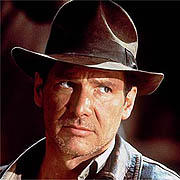
Ecclesiastes is often seen as a depressing book. For whatever reason, the writer is always going around saying that everything is meaningless. And then he says it again. And again. And again.
You get the picture.
And he's right. There is a lot of meaninglessness in this world. I was watching something yesterday on television called the "U.S. Open of Competitive Eating." It consisted of a bunch of people trying to find out who could gorge themselves with the most food.
Yet people are starving all around the world. Where's the meaning in that? For that matter, where's the meaning in war? Where's the meaning in the same old political arguments rehashed again and again? Where's the meaning in trying as hard as you can at something and yet still failing?
But I think there's something more here that he's saying--something more that God is speaking through the Scripture.
For despite all that the world throws at us, all that comes our way and makes think that we're just spinning around in circles...we're still alive. We are still here. And no matter what our lot is in life, there are still things God has given us to enjoy.
They might be small things, simple pleasures that in the grand scheme of things are unimportant...but still they and others like them are gifts of God, littles graces along the way that point us to the grace behind all of this too often meaningless life. Things like family. Things like friends. Things like sunshine. Things like snowflakes. Without at least some of these, the meaningless that is would quickly overtake us.
 Can enjoying such things make an eternal difference? I guess not in the most rigid sense. But then I suppose there are other parts of Scripture that point to those considerations.
Can enjoying such things make an eternal difference? I guess not in the most rigid sense. But then I suppose there are other parts of Scripture that point to those considerations.What we see here is a pure and simple biblical ethic of enjoyment...of contentment...of life. A chance to rest in what God has given us and not vainly strive after what isn't ours in the first place.
It's a lesson we all ought to remember.

























